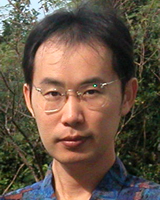- Home
- An Overview of Our Laboratories
- Ikeda Laboratory

| Ikeda Laboratory | |
|---|---|
| Faculty Member | Professor Yuzuru Ikeda |
| Phone | Extension 8548 |
| Laboratory Website | http://w3.u-ryukyu.ac.jp/ceph_lab/ |
Recommeneded Courses for Prospective Students
We recommend students to take classes for various fields of science and the humanities.
About Our Laboratory
Laboratory and Methods
We are developing a new science, namely “cephalopod science”, which seeks to unlock the mysteries of life through the viewpoint of cephalopods. To achieve this goal, we conduct behavioral research as well as research on aquaculture. The main focuses are
1) cephalopods occupy a unique phylogenetic position, and
2) they possess extraordinary intelligence. In addition, we also conduct life history research on cephalopods that are succeessfuly distributed over a wide range of the ocean. Our methodology includes rearing experiments as an important tool, but we also employ various other approaches according to each project.
Specific Graduation Research Project Themes
1) Behavior of cephalopods: We study how cephalopods, which have a highly developed intelligence base—said to be the largest brain amongst invertebrates—use their intelligence, as well as their social structure and interactions between individuals (social structure and communication development processes; sensory information processing systems and brain development; interspecies variation in cognition and the genetic relationship, etc.).
2) Life history of cephalopods: We depict the special characteristics of cephalopods of the tropical seas, shedding light on the many aspects of these organisms in the Ryukyu Archipelago region, particularly on early survival and grwoth (life history of bigfin reef squid; relationships between early survival and environmental factors; breeding characteristics of shallow sea octopus, etc.).
3) Developing aquaculture techniques for cephalopods: We develop aquaculture methodologies for tropical cephalopods. Based on these trials, we are attempting to make cephalopods as model animals for various research fields.
Prospective students should be....
We are looking for people who wish to properly learn.
Prospective students must pay particular attention to the fact that once rearing experiments start, we need to adjust our schedules to the pace of the organisms involved. See the following laboratory homepage for details on this: http://w3.u-ryukyu.ac.jp/ceph_lab/







